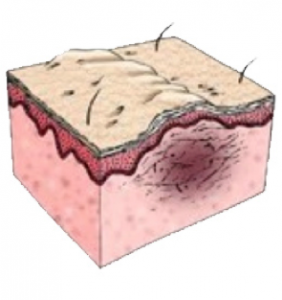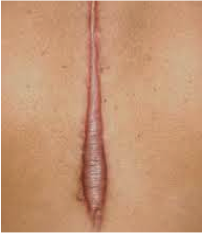
One of the main components of skin is the collagen protein. Skin collagen is primarily made from fibroblasts. During normal healing processes, fibroblasts begin leaking into the clot just under the scab. Once the clot is sufficiently soaked with fibroblasts, these cells begin to secrete collagen and release growth factor. The growth factor allows fibroblasts to begin expressing their contractile proteins. This allows the fibroblasts to contract and pull a wound tightly together.
Scar tissue is made from the same type of proteins as normal skin, however the composition of the proteins causes a difference in appearance. Specifically, instead of lying in a “basket weave” structure, the proteins are pulled together all in one direction, giving the scar a raised appearance. The most common of these forms of scar tissue are both hypertrophic and keloid scars. Their texture is usually smoother, does not contain sweat glands or hair follicles. These factors can lead to continuous skin irritation. A treatment regimen that begins as the scar is forming and continues for many months is the best method for reducing scar tissue.
Four Corners Compounding scar therapy cream is formulated in VersaPro cream base. VersaPro is an elegant, highly moisturizing cream formula with excellent penetrating properties. It is appealing for both pharmaceutical and cosmetic purposes. Contact your Four Corners Compounding representative or pharmacist for more information on how we can help your patients scar.
 Tranilast is an anti-allergic drug. Studies have shown tranilast to inhibit the release of histamine and prostaglandins from mast cells. It also suppresses collagen synthesis of fibroblasts derived from keloid and hypertrophic scar tissue but not healthy tissue. Tranilast also inhibits the release of transforming growth factor (TGF)-beta 1 from keloid fibroblasts. Topical treatment has been found to be more beneficial than when given orally. Relief of burning sensation, pain and pruritis associated with keloid scars.
Tranilast is an anti-allergic drug. Studies have shown tranilast to inhibit the release of histamine and prostaglandins from mast cells. It also suppresses collagen synthesis of fibroblasts derived from keloid and hypertrophic scar tissue but not healthy tissue. Tranilast also inhibits the release of transforming growth factor (TGF)-beta 1 from keloid fibroblasts. Topical treatment has been found to be more beneficial than when given orally. Relief of burning sensation, pain and pruritis associated with keloid scars.
Mometasone, a medium potency glucocorticosteroid, is used to reduce inflammation. Topical therapy is preferred over systemic therapy due to fewer associated adverse effects. Mometasone produces anti-inflammatory, antipruritic and vasoconstrictive actions.
Levocetirizine is a histamine (H1) receptor antagonist. Topical antihistamines can be used to reduce swelling and eliminate itching. Itching can lead to unintentional scratching which only further damages the tissue. Antihistamines have other anti-scar properties as well: they inhibit the inflammatory response which reduces scar formation. They are also antiproliferative agents and have been shown to inhibit the deposition and synthesis of collagen in keloid fibroblasts through suppression of the release of TGF-b1 from fibroblasts. Levocetirizine is a long acting antihistamine which provide for less frequent dosing and longer relief for patients.
